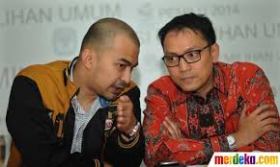Footsteps echo in the halls of Parapattan, a 182-year-old orphanage established in the Dutch colonial era. With tall doors and wide windows, the building shows its Dutch origins. In some parts, the walls look dingy, with chipped paint. Later, the footsteps lead to the stairs. On the second floor, a five-foot figure walks in. A white man with a clean shave, he effortlessly raises a white box. He places the box on a long table. Then, with a friendly smile, the man greets every journalist who has been waiting for an hour. The man is Charles Bonar Sirait, a television host running for Congress under the Golkar Party. That Saturday, Sirait attends a Christmas event in Parapattan, which he has served as board member for the past eight years. Explaining what's in the white box, Sirait says, “I bring ice cream to the orphans.” At one point, the announcer calls Sirait and asks him to come on stage. "Let us all pray for our brother, Charles Bonar Sirait, who is struggling to become a member of the legislature. May God bless every effort that Sirait makes,” the announcer says. Sirait, who has spent the past two decades on TV, banks on his public speaking skills and his involvement in charity as he tries to enter politics this year.
Immersed in social work
Born in Jakarta on March 19, 1971, Sirait began his career in the entertainment industry. He made his debut in the film directed by Arifin C. Noer, "Let That Moon." In 1987 he won the first prize in the competition “Teen Faces.” His showbiz career began in 1993 when he got a chance to host Zimfoni Music on SCTV network. Sirait also reportedly guided the TV quiz program Dream Wheels, a hit in Indonesia, which is an adaptation of the World Quiz Wheel of Fortune that aired on SCTV network. In December 2007, Sirait launched his first book titled “The Power of Public Speaking: Success Tips on Public Speaking.” Published by Scholastic Press, the book became the first Indonesian book received in the Library of Cornell University in New York, USA, and became a national best-seller upon its second printing three months after the launch. Sirait established CBS Charles Training and Development as a personal communication training institute. He often helped leaders and professionals in communicating with the public, ranging from regional heads to political party leaders, organizational spokespersons, spokespersons of companies, and top management. Sirait has become a celebrity despite living in the glamorous world. He does not, however, forget to engage in social mission. Sirait is involved in the activities of the World Wildlife Fund, actively seeking donations for Thalassemia Foundation. He also helps in mentoring young people. In 2013, Sirait decided to go beyond social work, to compete for seats in the legislature. "I'm interested in the place of the education commission to carry out the social movement 'Back to School,'" says Sirait. He is increasingly concerned about the quality of education in Indonesia, which is directly related to the conditions of teachers. "Quality of education in Indonesia is very bad. The low level of teacher quality greatly affects the quality of the nation. The welfare of teachers should be improved," says Sirait. In addition, he says, the deployment of qualified teachers also needs to be considered, not only in Jakarta and Java, but also in Sumatra, Borneo, and other islands in Indonesia. To win the support of voters, Sirait repackages his power as celebrity for political means.
1. Sirait portrays the image of an education advocate.
One of his methods is to hold public speaking competitions for students and teachers. Sirait announces the competition through a video and uploaded the video to Youtube. An example is found in the video below. http://www.youtube.com/watch?v=4qqGJFKMCrI
In this video, Sirait is standing in the middle of the frame with a white background. This is a medium shot, which, according to our course e-book, “brings the viewer within the subject's social sphere.” His black coat contrasts with the white background, highlighting the face of Sirait. He becomes the center of attention. While holding a book, Sirait explains the mechanics of the public speaking competition. By posing with a book, Sirait conveys the message that he cares about education. The medium amplifies the visual message. Here, he uses Youtube to attract voters among the youth, the target audience of the video-sharing platform.
2. Sirait depicts himself as a casual Indonesian, easy to relate to.
In another video, Sirait stands in front of a school gate. This, too, depicts his advocacy: education. (Watch more in the video below.) http://www.youtube.com/watch?v=RJHfcOpSYNY ] Here, Sirait talks straight to the camera, like a blogger. He invites the viewers to join him in entering the school by making an about face. This is a visual cue that he wants to explore the place behind him, and invites viewers to keep him company. He shows himself entering the school without frills. He shakes hands with people, walks without a bodyguard in the frame, and conveys the message that he is easy to relate to. He brings the sensitivity of a TV star. He knows that a celebrity's casual attitude leads to charisma, which Max Weber describes as “one type of social authority.” Through this “social authority,” he wants to attract voters. Some elements in the video, however, can distract viewers. Sirait's eye position, for instance, is not in the upper thirds of the frame. The music, too, is too loud. It is better replaced by natural sound to better depict the school's atmosphere. He also shows himself as a good listener. 
This photo, taken from the website merdeka.com, provides a good example. Here, Sirait is attending political discussions. Next to Sirait is David Chalik, a movie player and celebrity also running for the legislature. Chalik comes from Hanura, different from Sirait's party. It’s a symmetric picture. The point of attention is divided between Chalik and Sirait. However Sirait is seen to have more clout than Chalik because Sirait is being listened to intently. This is a positive value for members of the legislature: that they should listen to the aspirations of people. Chalik looks more like a military commander who was giving the orders.

This photo, taken from the website merdeka.com, provides a good example. Here, Sirait is attending political discussions. Next to Sirait is David Chalik, a movie player and celebrity also running for the legislature. Chalik comes from Hanura, different from Sirait's party. It’s a symmetric picture. The point of attention is divided between Chalik and Sirait. However Sirait is seen to have more clout than Chalik because Sirait is being listened to intently. This is a positive value for members of the legislature: that they should listen to the aspirations of people. Chalik looks more like a military commander who was giving the orders.
3. Visually, Sirait repackages himself as a politician by always wearing his party's colors.
We see this in the two videos above. In the first video, Sirait appears wearing a dark suit and a yellow shirt beneath it. The selection of shirt color is taken into account. Sirait is good at playing with the various elements for his campaign, one of which is the element of color. Yellow looks very striking in contrast with black. Yellow is the symbol of Golkar Party. If there is a politician who wears a yellow shirt, then most likely he is with the Golkar Party. By making it a point to always wear yellow, even a tinge of it as an undershirt, Sirait makes a visual reminder that he is not only a celebrity, but also a politician wannabe. He also uses this symbolic color in the second video. It is more striking because he uses it this time as an overcoat. In any case, the color is important to establish his new image.
Wanted: Politicians 'rooted in public'
Many criticize celebrities who go into politics. One political observer, Lely Arrianie, explains that celebrities who become politicians should have good qualities and not just be popular in mass media. "The artists who entered parliament should be able to shine in the media and be rooted in public," she says as quoted by detik.com Arrianie explains it is a mistake to choose an artist as political party candidate because of the popularity. Sirait disagrees. Candidates from any profession, according to the law, may run for the House of Representatives. This includes artists. Charles himself admits he is more comfortable as an artist rather than as a politician. But his desire is to contribute to the nation, making him want to get out of the comfort zone . "Honestly (I'm) more comfortable being (a) celebrity because just reading a script can mean several million dollars . (It's a lot more tiring) in the House of Representatives and (requires) hard work. Why would I want to go ahead? Because I like the challenge," he says. Politics, however, is not merely about challenging oneself. It is about serving others – with a good grasp of the bureaucracy and the system they seek to change. For Sirait, as well as Vilma Santos and other celebrities, this is the best reason to enter politics.





0 komentar:
Post a Comment